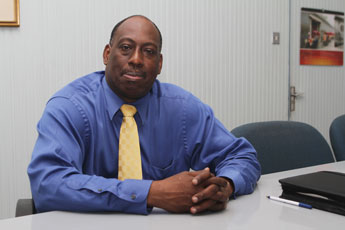Between January to June 2011, the Queen Elizabeth Hospital had 435 stroke patients and now the hospital plans to decrease the number of stroke admissions to the lone Barbados hospital.
According to the Chief Executive Officer of the QEH, Dexter James, 2014 will see better outcomes for the rising number of stroke admissions. Last year, noted Barbadian cardiologist and consultant, Dr. Anthony Harris said that the island reported three strokes per day and 11 heart attacks per month on average.
James said that the QEH has embarked on a relationship with officials from Yale University in a strategic health programme to reduce the number of individuals presenting with this potentially deadly event.
James made his remarks at a town hall meeting at the Darryll Jordan Secondary School which included Dr. Harris and head of the Accident & Emergency Department, Dr. Chaynie Williams. Cardiologist Dr. “Tony” Harris revealed that there was now a ward dedicated solely to the treatment of strokes.
49 strokes a month
Harris indicated that there are now 49 strokes per month being treated at the QEH and that most of the time, the patients also were diabetic. This trend has the team from the QEH “very worried” and while looking critically at the issues of stroke, James also indicated that he was equally worried about the incidence of non-communicable diseases NCDs.
“NCDs do have a very profound impact on the disability adjusted life years statistics. If persons exercise personal responsibility for their care then they would not be at the hospital at all and it would free up some beds and allow us to take care of more patients”, James said.
Dr. Williams indicated that 41 000 attended the QEH while 96 000 people account for the hospital’s out-patient and there were 21 000 annual admissions with 1000 prescriptions being filled each day.
The hospital has also been hit with budgetary cuts which slice into its operating cost as reported by in the island’s last budget. According to reports the QEH has had its budget cut by around $30 million dollars. In the interim, it owes pharmaceutical companies millions of dollars and is operating (at press time) with one ambulance serving an entire island.
However, according to Andrew Brathwaite, representing the Barbados Ambulance Service, four new ambulances will arrive in Barbados which should improve the hospital’s ability to respond faster to calls.
In a recent press conference to address other issues, Dr. David Byer had said that the three-wheel ambulances donated to the hospital were “not practical”. He also said that they “did not have the capacity” and should be put to some other use.
“With the best will in the world, the QEH will not see a reduction in strokes unless individuals first preventatively take actions to deal with NCDs and other issues. We all need to eat a well-balanced diet and exercise as well as lower bad cholesterol levels. Additionally, post stroke care is critical to preventing another stroke. Rehabilitation for stroke and other life-altering illnesses and disabilities or lifestyle diseases is as important as prevention. More emphasis must be placed on prevention and exercise. Those who have suffered events can be rehabilitated once given medical clearance. This should be done so that individuals can carry out activities of daily living which certainly can be a challenge after a stroke”, said Pedro Forte, Specialist in Exercise Physiology and Certified Personal Trainer.














